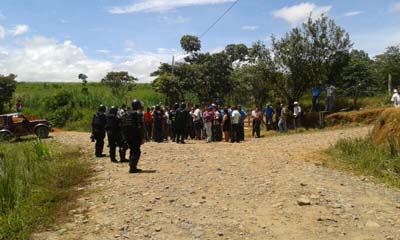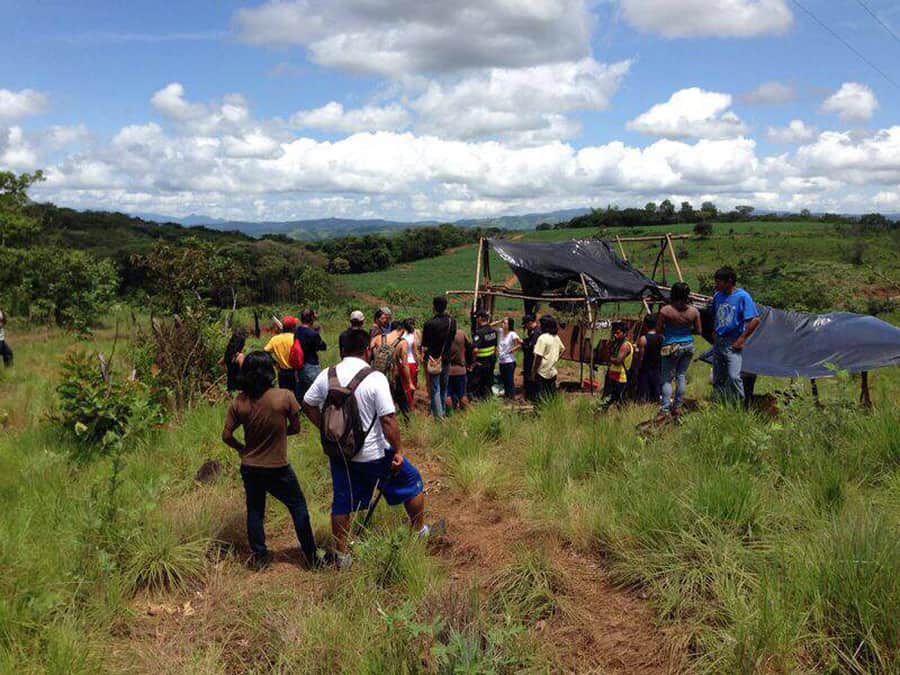Costa Rican indigenous leaders hope the long-delayed Indigenous Autonomy Bill might finally get a hearing in the Legislative Assembly as result of April’s Inter-American Commission on Human Rights ruling ordering the government to take precautionary measures to protect indigenous groups in the Salitre Indigenous Reserve in southwestern Costa Rica.
Indigenous leaders said the bill, which would create new forms of governing the reserves and provide indigenous communities more self-rule, could offer the government a way to resolve the contentious issues in Salitre, where an indigenous movement to retake land – percolating since early 2012 – has sparked a violent reaction from non-indigenous people who claim ownership.
“It could be that [the Indigenous Autonomy Bill] provides the government with a policy that helps resolve conflicts like Salitre,” said Donald Rojas, a Brunca member of the Mesa Indígena, an ad hoc group that has been pressuring for passage of the bill since it was first drafted 19 years ago.
The bill is opposed by powerful interest groups including large landowners and mining companies that have their eyes on mineral deposits inside some of the 24 indigenous reserves, including large copper reserves in the highlands of the Talamanca Mountains that run through Panama and southern Costa Rica.
The government already has parceled out the Talamanca region to mining companies in concessions that cover virtually the entire Talamanca highland, but final approval is pending votes by the Legislative Assembly.
The approval of mining inside indigenous reserves without the consent of the indigenous people to whom they belong would be a violation of the International Labour Organization Convention No. 169, to which Costa Rica is a signatory.
Costa Rican Communications Minister Mauricio Herrera said President Luis Guillermo Solís’ administration would uphold the country’s international commitments regarding its indigenous population.
“The government is respectfully committed to the international conventions the country has signed on the subject of indigenous people’s rights,” Herrera said.
But indigenous leaders said they want the convention signed into Costa Rican law, which would occur with the passage of the Indigenous Autonomy Bill, which makes the ILO convention the guideline for protecting indigenous rights in the reserves.
Bribrí leader José Dualok Rojas, brother of the controversial Salitre Bribrí leader Sergio Rojas, said another government might not be as faithful in applying the ILO convention in preventing mining in indigenous territories.
“What is certain is that the concessions are adjudicated to the multinational companies, and that makes for a latent risk,” said José Dualok Rojas. “Any politician can have a change of heart or can do something foolish.”
Bribrí Iriria
Bribrí cosmology sees the Earth and its ecosystems as a sacred living being called Iriria. That precludes any mining inside indigenous territory, José Dualok Rojas added.
He also voiced the hope that the government would now be moved to pass the autonomy bill under pressure by the IACHR order for precautionary measures.
“Now because of all the problems with Salitre, they are going to present this bill as a possible solution to the conflict,” José Dualok Rojas said.
Other indigenous supporters are not as optimistic.
“I very much doubt it,” said University of Costa Rica anthropologist Marcos Guevara, regarding passage of the autonomous bill. “As much as I would like to see it happen, there’s just too much opposition to it in the Legislative Assembly.”
Another source of pressure for its passage is a July 15 report by Gabriella Habtom, secretary of the United Nations Committee on the Elimination of Racial Discrimination, citing “the grave and persistent violation of indigenous people’s rights in Costa Rica.”
“This report addresses the pattern of pervasive, long-standing and inter-connected violations or denials of the rights of indigenous peoples in the Republic of Costa Rica, and the ongoing situation of impunity in which they occur and persist,” Habtom wrote.
The current Indigenous Law, signed in 1977, gives indigenous communities dominion over indigenous reserves, but gives power over governance to the central government institutions such as the National Commission of Indigenous Affairs (CONAI) and the National Community Development Directorate (DINADECO).
Indigenous leaders complain that both institutions defend more the interests of non-indigenous people than indigenous communities. Moreover, the indigenous complain that neither institution has done anything to recover land for indigenous communities within the 24 reserves, an estimated 60 percent of which is occupied by non-indigenous landholders.
Some of the land is in the hands of “whites” who occupied it prior to 1977 when the Indigenous Law went into effect and who must be compensated if removed from the territory. But much of the land is in the hands on non-indigenous people who squatted on it after 1977 or illegally purchased it backed only by a bill of sale.
Indigenous leaders blame the failure of the government to bring order in the past 38 years for the rise of an indigenous movement in Salitre to take back the land and confront non-indigenous “owners” who try to prevent them – sometimes violently – from retaking it.
Matrilineal clans
While the Inter-American Commission on Human Rights found in favor of Bribrí and Teribe peoples, Herrera said the issue is more complicated than a conflict between indigenous and non-indigenous.
The Bribrí are divided into matrilineal clans, Herrera said, meaning that an individual’s identity within the community is determined by whether or not that person’s mother is Bribrí. Someone whose father is Bribrí and mother is Cabécar – a group closely related to the Bribrí – is considered Cabécar, not Bribrí.
The indigenous movement headed by Salitre Integral Indigenous Development Association President Sergio Rojas has attempted to reestablish a Bribrí social order in the community, and Rojas has been accused of intimidating indigenous individuals who are not “of clan.”
Rojas denies he has intimidated anyone and said that people of mixed heritage are welcome in the reserve – as long as they accept the decisions of the development association.
Sary Sosa, a Cabécar farmer, told the daily La Nación that she feels threatened by Rojas, even after multiple community meetings. She characterized the situation as a division between the “indigenous that go with Sergio Rojas and the indigenous who don’t go with Sergio Rojas.”
“I don’t go with anything that he says,” Sosa said. “I don’t respect him as a leader. I don’t accept him, I don’t want him, I would even like them to take him out of the territory.”

‘Violence brings violence’
Last week DINADECO removed Rojas from the presidency of the development association alleging that he was barred from public service by a court order after serving seven months of preventive detention for alleged irregularities in the management of a government environmental services fund (FONAFIFO). Rojas said the charges were trumped up because of his advocacy in the Salitre controversy, which has seen multiple cases of violence directed at indigenous families.
Rojas told La Nación that the Bribrí would defend themselves from violence aimed at them if necessary. “Violence brings violence,” Rojas warned.
“If the state doesn’t guarantee our security and our rights, we have to act as we have done; we have to find a way to guarantee our survival. And if violence occurs, it will be the fault of the state,” Rojas said.
Rojas’ supporters said the Bribrí leader has been the target of political persecution by the government, which is threatened by the emergence of a strong indigenous leader capable of starting a movement to reclaim indigenous land at the national level.
“Because of the circumstances, he has taken a very strong position, and the violent actions aimed at [Sergio Rojas’ group] has caused him to make some mistakes,” said Donald Rojas, who is not related to the Bribrí brothers.
Donald Rojas said a lively debate is underway within the Solís administration on whether or not to press forward with the Indigenous Autonomy Bill at the Legislative Assembly.
According to Cinia Jiménez, of the Legislative Assembly’s Office of Citizen Participation, the Indigenous Autonomy Bill (No. 14,352) currently is 37th on the Assembly’s docket. That means it likely will not come up during the Assembly’s ordinary session that ends in November. The Solís administration, however, would have an opportunity to bring the bill before the Assembly in an extraordinary session that begins in December and lasts through April 2016.
One powerful voice against the indigenous autonomy issue is governing Citizen Action Party founder and lawmaker Ottón Solís. He wrote an opinion piece that appeared in the daily La Nación on Oct. 21, 2014 criticizing Sergio Rojas’ Salitre movement as collectivist and in conflict with Costa Rica’s Constitution.
Lawmaker Ottón Solís didn’t respond to a request for comment.
Donald Rojas said a dose of racism also lies behind some of the opposition to the Indigenous Autonomy Bill.
Said Donald Rojas: “There are those who say that we should be made to live like white people, that we should modernize ourselves.”






